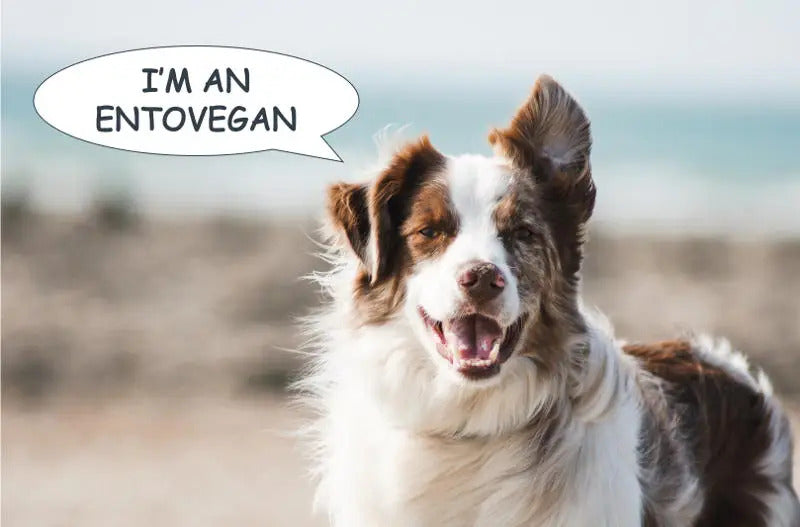
When it comes to nutrition, there always seems to be something new coming down the pike. Let’s go back a few years – how many people did you know who were eating a raw food diet, or were gluten free, vegan or how about Paleo?
We’re constantly learning more about nutrition, food sourcing and the effect of that diet on our bodies. All of this information can help us make better decisions for ourselves and for the rest of our family – and that includes your Dog!
What is an Entovegan?

What exactly is entoveganism? In short, it’s a plant-based diet that includes insects The word itself is a hybrid between entomophagy and veganism. Entomophagy is the practice of eating insects.
Since you’re reading this blog, we’ll assume veganism is self-explanatory and just concern ourselves with the former.
Humans have been consuming insects since prehistoric time and 80% of the world’s nations currently incorporate it into their cuisine. In Ghana, termites are a popular source of protein, while in Thailand cricket snacks are commonplace.
So, entoveganism? In short, it’s a plant-based diet that includes insects. Let’s get into it.
Health Benefits of Being an Entovegan
You may be thinking, “Eating insects doesn’t seem very vegan to me…” and you’re right – eating insects isn’t vegan! Josh Galt from Entovegan.com puts it this way “I’m not a vegan who eats insects, I am an entovegan – a new word and philosophical / dietary framework.”
Entoveganism takes a plant-based diet and supplements it with insect protein for a variety of health related reasons. Insects like crickets and black soldier fly larvae are high in protein while containing a complete amino acid profile. In addition, these bugs are high in prebiotic fiber which makes them great for your gut.
Some insects (there are over 900,000 different kinds) are also high in minerals like Vitamin B12, calcium, iron and zinc. These vitamins and minerals are commonly supplemented in vegan diets because they’re scarce in plants and vegan foods. Josh Galt points out for those concerned with the animal (insect) lives at stake, “science to date shows some insects lack a central nervous system, and don’t feel pain.”
Entoveganism proves to have selling points for vegans concerned with health, but what about all the environmentalists out there?
Eco-Benefits of Being an Entovegan
Chances are you may have already heard the buzz (get it?) about insects being the food of the future. Farming insects gets a lot of hype these days because it’s cost efficient and sustainable.
Let’s use cricket farms as an example.
A cricket farm uses far less land than traditional livestock as well as soy or other vegan proteins.
This is because cricket farms are able to go vertical. Crickets are farmed in barns with multiple floors which cuts down on the amount of necessary farmland.
Cricket farms also use a fraction of the water and omit a fraction of the methane – a huge contributor to global warming. You can see why bugs would be a viable food source for our changing planet.
From a cost standpoint, cricket farms use far less resources and produce more protein per ounce than traditional proteins like beef or chicken.
The “Ick Factor” – Get Over It!
Entoveganism is quickly becoming an option for those who care about their own health as well as the planet’s. However, we have to reckon with the “ick factor.” For some Americans, eating insects can be a hard sell. Pitching your new entovegan lifestyle to friends and family at the dinner table could be an open invitation for ridicule. 
Bugs, however, already have a place on the western plate.
Many Americans unwittingly eat bugs everyday in the form of carmine (ever have a skittle? Or a red skittle? Hate to break it to you… but you’ve eaten a bug). Other commonplace foods containing insect remnants include mezcal and honey.
Many entovegans point out that insects, biologically, aren’t that far from crustaceans (esp. shrimp) or other sea creatures that find themselves on menus nationwide. Although bugs haven’t achieved normality quite yet, with their nutritional and sustainable viability, this may start to change.
Can My Dog be an Entovegan?

Not only can an entovegan diet work for your dog, it might actually be the answer to your dog’s food allergies!
The benefits that appeal to people on an entovegan diet are the same for the dogs. There’s a substantial ecological cost to feeding our dogs and cats. Pet food is responsible for 25-30% of the total environmental impact of animal protein production in the US.
Insect protein-based dog food (like, ahem, Jiminy’s Cricket Crave and Good Grub) exponentially reduces our dogs’ carbon pawprint! Also, the nutritional benefit of these insect proteins is amazing and not only meets the maintenance requirements of our dogs but also delivers prebiotic benefits as well!
And don’t forget about those allergies! A 2018 study concluded insect protein-based dog foods are a promising alternative for dogs with food intolerances. Twenty dogs with skin problems related to food sensitivities were fed cricket protein-based food, and 60% of them showed significant improvement in their symptoms, while only one dog showed negative impacts. Finally, the dogs don’t overthink it. If it tastes good, they’re in!
So, if anyone asks, tell them your dog is an entovegan!

